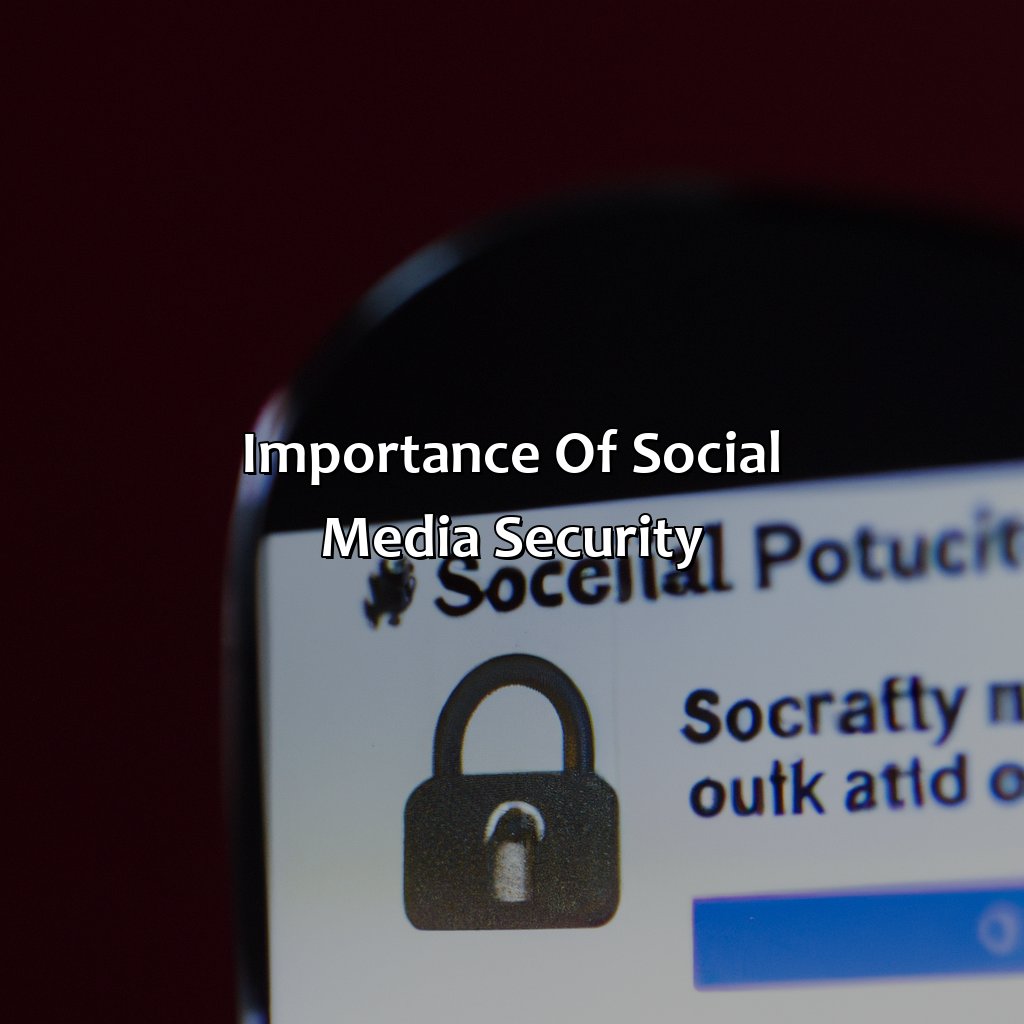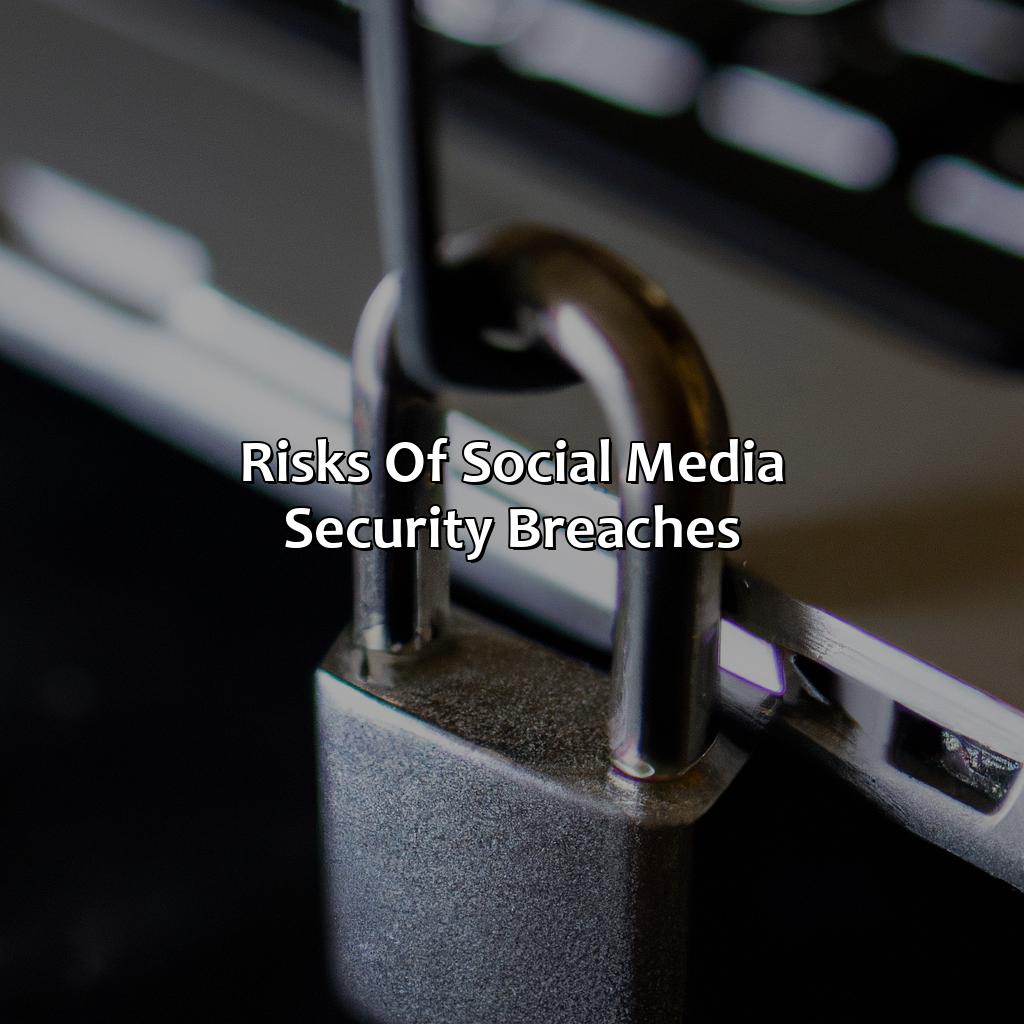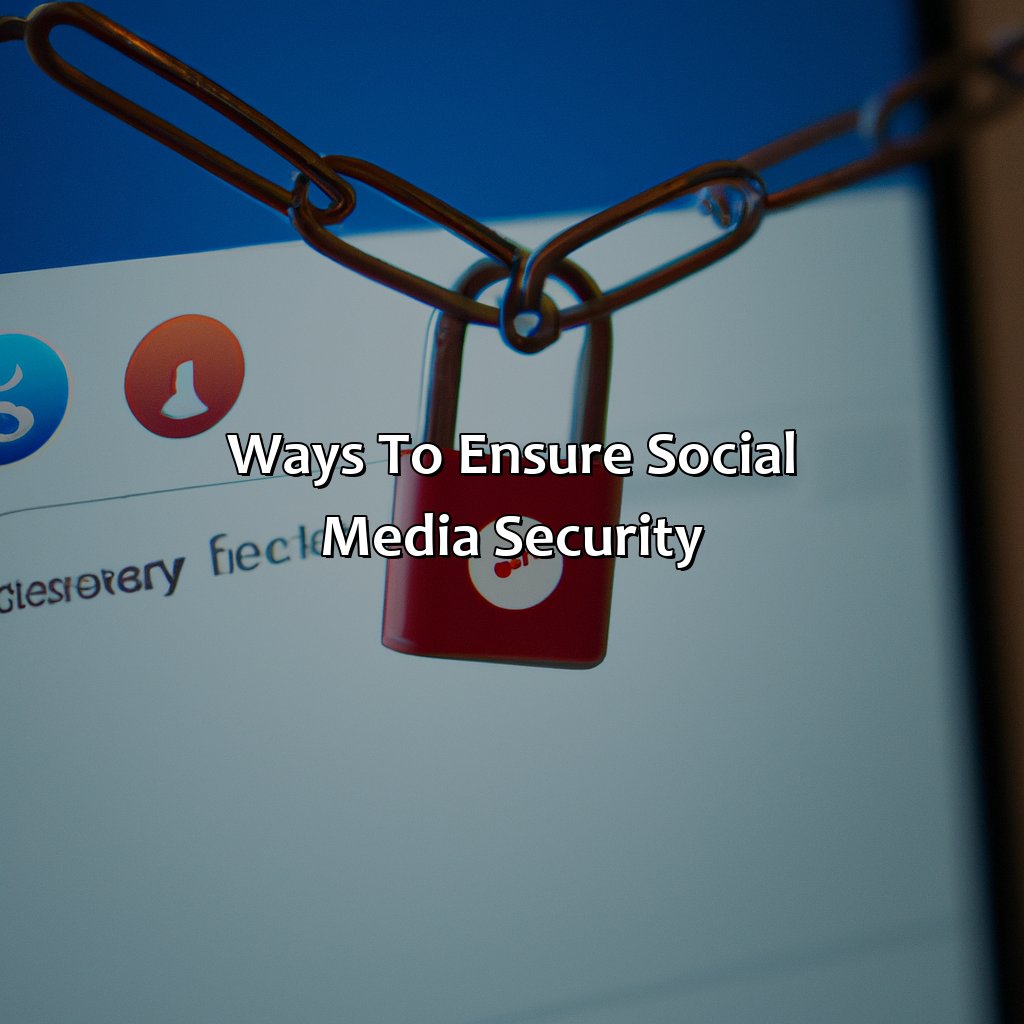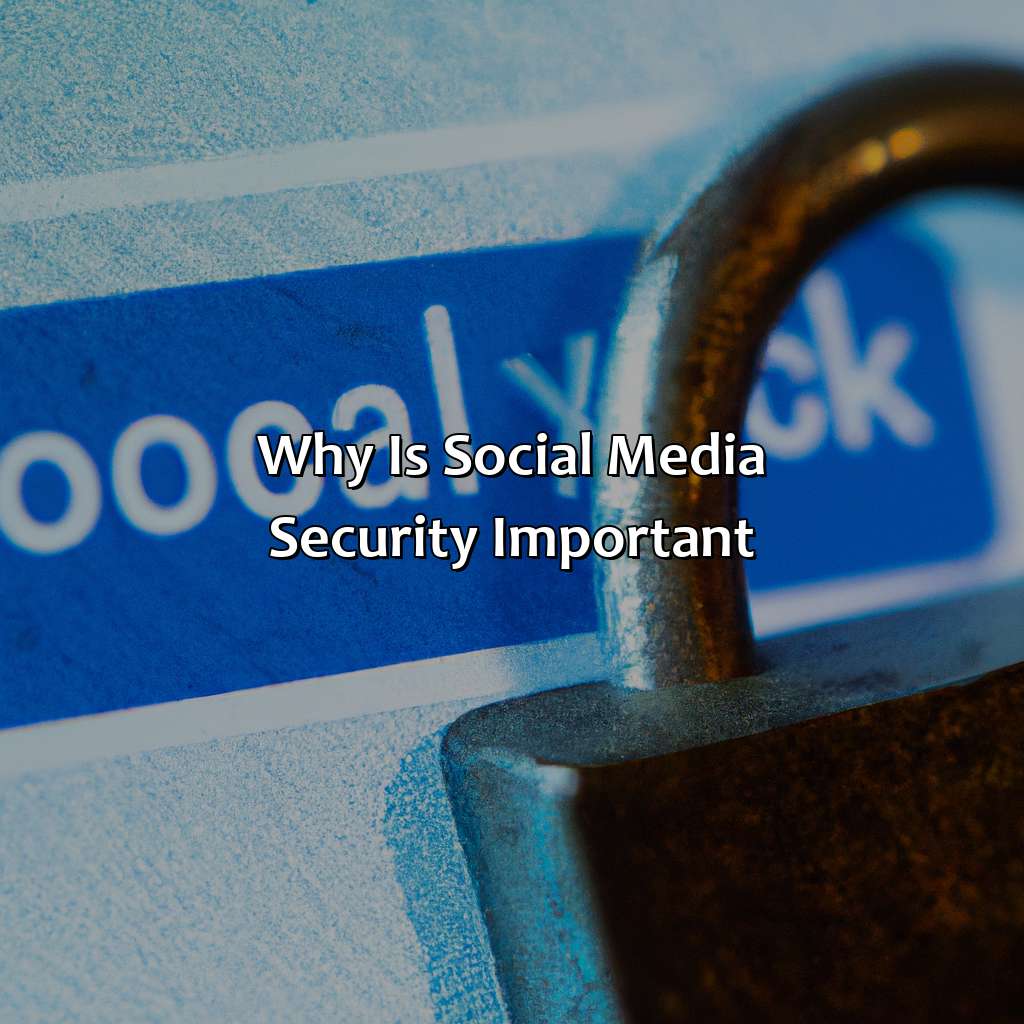Why Is Social Media Security Important?
Key Takeaway:
- Social media security is important to protect personal data and prevent identity theft, financial scams, and other risks associated with cybercrimes.
- Social media security breaches can result in the exposure of personal data, including login credentials, financial information, and other sensitive information.
- To ensure social media security, it is important to use strong passwords and enable two-factor authentication, adjust privacy settings, avoid suspicious links and pop-ups, regularly check account activity, and update antivirus and firewall software to protect against malware and other threats.
Are you aware of the security threats posed by social media? In this article, you will learn why protecting your online presence is essential and how to ensure your social media security.
Importance of Social Media Security
Social media security is crucial in safeguarding user information and privacy. Without proper security measures, social media platforms become vulnerable to cyber-attacks, leading to the leakage of sensitive data. Ensuring the security of social media accounts is not only important for individuals but also for businesses and organizations that use social media as a means of communication and advertising. Social media security can prevent financial scams, identity theft, and reputational damage to individuals and organizations.
To maintain social media security, users must take precautions such as creating strong passwords, not sharing personal information, and being cautious of suspicious links and messages. Social media platforms also play a critical role in providing security options such as two-factor authentication and encryption of sensitive information in transit. Regularly updating security software and systems is also essential to prevent potential security breaches.
In addition to these measures, it is important to stay informed about the evolving online threats and to keep an eye out for new security options and upgrades. A proactive approach to social media security can help prevent breaches and reduce the risks associated with social media use.
In the past, many social media platforms have been subjected to high-profile cyber-attacks leading to the exposure of user data. For instance, in 2018, a major Facebook data breach exposed the personal information of millions of users, causing a loss of trust in the platform. Such incidents highlight the importance of social media security and the need to prioritize it when using these platforms. Ensuring social media security can help protect individuals and organizations from potential data breaches and their associated consequences.

Image credits: retiregenz.com by Yuval Duncun
Risks of Social Media Security Breaches
Delve into the potential threats of social media security breaches. These include personal data theft, financial scams, and identity theft. Learn how personal data can be taken without permission. Also, uncover how financial scams can lead to financial loss. Moreover, understand how identity theft can result in grave issues such as fraud, misuse of details, and blackmail.

Image credits: retiregenz.com by James Arnold
Personal Data Theft
A breach in digital security can lead to the theft of personal information, which can be detrimental. Cybercriminals use this information to commit identity theft and fraud. Preventing this type of crime is necessary. By setting strong passwords, regularly updating a computer’s antivirus software, and being aware of phishing scams, one can avoid falling victim to identity theft.
It is crucial to protect your personal data when using social media platforms, as cybercriminals may gain access to one’s data by creating fake profiles that look legitimate or by hacking an account. One must take precautions seriously and manage data sharing permissions properly. It is crucial for users never to post sensitive information such as passwords, credit card numbers, or social security numbers while using these platforms.
An additional consideration one must have is the over-reliance on public Wi-Fi networks in coffee shops and restaurants that puts user-data at risk through the interception of unauthorized network traffic. Cybercrime among everyone visiting these places has surged rapidly, and hence it’s better to stick around secure networks.
Individuals can reduce the risks of their personal information becoming compromised by following simple steps such as updating security software frequently and setting strong passwords. While most options could sound very basic and regular nowadays when repeated multiple times; following best practices when accessing social media accounts should not be overlooked and will probably save many from becoming a potential victim of cyberattacks.
Scammers on social media have a better chance of stealing your money than the Nigerian prince who keeps emailing you.
Financial Scams
With the increasing popularity of social media platforms, the risk of falling prey to deceptive financial scams has also multiplied. These scams can take various forms like investment frauds, bogus loan offers or phishing attempts. The scammers often impersonate trusted sources and lure people into divulging their personal details or transferring funds into their accounts.
Such financial frauds not only have monetary repercussions but can also harm one’s reputation and emotional well-being. Moreover, the legal procedures involved in recovering the lost funds or prosecuting the culprits can be arduous and time-consuming.
To minimize the chances of getting tricked by such scams, several preventive measures can be taken like verifying the credentials of any unknown person/entity who asks for your financial information or money transfers. It is advisable to avoid clicking on suspicious links or downloading attachments from unverified sources as they may contain malware that steals sensitive data.
In today’s digital age, where any transaction is just a click away, staying cautious while being online has become imperative. Therefore, it is crucial to keep oneself informed about the different types of financial scams and stay alert while using social media platforms. Your vigilance can save you from becoming a victim of these schemes and protect your hard-earned money.
Social media is like a buffet for identity thieves, with personal information being the main course and passwords being the dessert.
Identity Theft
It is imperative to understand the dangers of digital identity theft in today’s society. With an increase in social media usage, attackers have more opportunities to gain access to personal information. Cybercriminals target victims by posing as trustworthy entities. They can leverage this data to perpetrate fraud or identity theft.
The seriousness of identity theft cannot be overstated, as it not only leads to financial loss but can also result in reputation damage and emotional distress. Staying vigilant with your social media accounts is crucial. Limiting personal information and using strong passwords can help mitigate risks.
Furthermore, always using a secured network connection, verifying online solicitations or requests before obliging them, and regularly checking your credit reports should also be implemented. With these precautions in place, one can substantially reduce their chances of becoming a victim.
Overall, digital identity theft is a significant threat that must not be taken lightly. Being mindful about the security of social media profiles and taking preventative measures is vital to safeguarding one’s reputation and finances from intrusion by cybercriminals.
Protect your social media like you protect your ex’s embarrassing photos – with layers of security.
Ways to Ensure Social Media Security
Strong passwords and two-factor authentication will help ensure social media security. Privacy settings should be set. Avoid suspicious links and pop-ups. Check account activity regularly. Update antivirus and firewall software. Following these steps will protect your personal info on social media.

Image credits: retiregenz.com by Yuval Arnold
Strong Passwords and Two-Factor Authentication
Creating Impregnable Social Media Accounts with Robust Authentication Methods
Ensuring the safety and security of your social media accounts should be your topmost priority. One such way to protect them is by having strong passwords and enabling two-factor authentication.
- Use a combination of lowercase and uppercase letters, numbers, and symbols that are at least 12 characters long to create a robust password
- Avoid using personal information such as birth date, pet names, or home address in creating your password
- Frequently update your password every three months to avoid hacking incidents
- Enable two-factor authentication (2FA) for an unauthorized user’s entry as it requires another step apart from entering your password for account login
- Consider utilizing varied 2FA methods available, which require biometric checks, unique security keys, SMS text messages as one-time passwords among others.
It is essential to note that by enabling these methods mentioned earlier in social networking sites like Facebook or Twitter pages will not ensure complete protection. Taking extra precautions may include keeping only necessary information updated on profiles for added privacy controls without compromising confidentiality.
Reports have shown that around 74% of internet users worldwide were victims of cybercrime and data breaches out of which 39% were affected via unsecured account passwords while accessing social media accounts (source: Statista). So it is high time we implemented strong security measures to ward off any potential hackers trying to breach privacy unlawfully.
“Your privacy settings are like your underwear, always make sure they’re secure and not showing to strangers on the internet.”
Privacy Settings
When it comes to safeguarding your personal information on social media platforms, securing your ‘Sharing Settings’ is paramount. Ensure that you review privacy settings on each of your social media accounts and set restrictions according to the level of confidentiality desired. By enabling limits on who can view or share your information, or implementing a verification process for unknown users, you can minimize potential risks associated with identity theft or cyber-stalking.
To further bolster security, you can consider employing software programs and applications that track breaches and reports suspicious activities in real-time. By keeping up-to-date with the evolution of digital security measures, you can stay proactive and prevent serious incidents from occurring.
It is crucial to remain vigilant when it comes to the management of sharing options; hacks have frequently targeted oversharing platforms such as Twitter and Instagram. It’s also important to be cautious about what you choose to post online, as once something is posted it is almost impossible to take it back. Ultimately, prioritizing digital privacy is essential to protect yourself from unwanted exposure and maintain control over your data.
A cautionary example of neglecting these best practices occurred in 2013 when Target department chain failed to respond quickly enough after a massive data breach compromised customers’ credit card information. This mistake cost the company a total of $18.2 million in settlement fees – highlighting the importance of cybersecurity measures not only for personal safety but also for large scale entities.
Clicking on suspicious links and pop-ups is like playing Russian roulette, except you don’t even know what the prize is.
Avoiding Suspicious Links and Pop-Ups
Being vigilant against Malware threats is an essential part of ensuring Social Media Security. Careful examination of unknown sources, links, and pop-ups is key to Avoiding Suspicious Links and Pop-Ups on social media platforms. Users should stay alert while clicking on any external link or download button, as it could be a trap set by the hackers to gain unauthorized access to their system.
It’s smart to keep ad-blockers installed and updated on their browsers while using social media handles. Scammers exploit user’s vulnerabilities by taking advantage of curiosity-arousing headlines. It’s essential to double-check the URLs before clicking the link, as many web addresses are masked behind shortened URLs that could lead you into scammy websites with malicious intentions.
It is also vital to avoid downloading files from unknown sites or pages linked through social media channels without thorough checking for authenticity. It’s recommended always view comments and reviews before following any link or downloading any file & If possible, use genuine anti-malware software solutions for protection against phishing scams and malware threats.
By following these suggestions, users can ensure that they are avoiding suspicious links and pop-ups responsibly while safeguarding their digital identity. Stay Vigilant!
Stalking your own social media accounts may sound creepy, but it’s better to be a creep than a victim of identity theft.
Regularly Checking Account Activity
Monitoring Account Activity Regularly
Social media platforms have become essential and with this comes the responsibility of securing your account. To ensure social media security, monitoring account activity regularly is imperative.
- Check for Suspicious Activity: Keep a close watch on your social media account activity by checking it frequently. This can help you quickly identify any suspicious activity.
- Stay Alert for Phishing Scams or Malware: Be vigilant while opening links or attachments from unknown sources. Regularly updating passwords can also help avoid such attacks.
- Use Two-factor Authentication: Adding an extra layer of protection can go a long way in securing your social media accounts. Enabling two-factor authentication is highly recommended.
In addition to these measures, it is crucial to personalize privacy settings, report strange messages or activities immediately, and use strong passwords.
According to a report by Pew Research Center, in 2021, over 69% of adults in the United States use social media platforms regularly.
Updating Antivirus and Firewall Software
To ensure the safety of social media activity, it is crucial to keep updating antivirus and firewall software. This helps in safeguarding devices against malware, viruses, and other online threats. Keeping antivirus and firewall software updated would enhance overall security and prevents unauthorized access to personal information.
- Antivirus software regularly scans for malicious programs.
- It protects from harmful viruses and worms that could damage the computer system.
- A firewall adds another layer of security by controlling the incoming and outgoing network traffic.
- Updating Antivirus software comes with bug fixes, new features, and improved security measures.
- New viruses are detected on an ongoing basis, and so regular updates make sure recent threats don’t slip through unnoticed.
- Some versions can either be updated automatically or manually via their settings tab.
Up-to-date antivirus and firewall software mitigates any chances of cyber-attacks. Apart from monitoring incoming traffic, firewalls analyze applications too before installing them on devices.
A lapsed update schedule could result in an exploited vulnerability that hackers target to gain control over a network/individuals’ information.
Stay up-to-date with the latest versions of internet security tools, eliminate known weaknesses for hackers to exploit, ensure a safer browsing experience free from online threats that could put privacy at risk.
Security hinges on everyone staying vigilant about keeping all applications up-to-date; regular checks need to remain a part of daily routines. Don’t risk being left behind; protect yourself against the ever-growing threat impact of cybersecurity breaches by updating your antivirus/firewall regularly.
Five Facts About Why Social Media Security Is Important:
- ✅ Social media security is important because of the potential for identity theft and fraud. (Source: Norton)
- ✅ A strong password is a crucial component of social media security. (Source: Lifewire)
- ✅ Security settings on social media platforms can help protect user privacy and limit exposure to cyber threats. (Source: Digital Guardian)
- ✅ Social media security awareness education can help users better understand potential risks and how to protect themselves online. (Source: Security Magazine)
- ✅ Social media security breaches can damage a user’s online reputation and cause long-term consequences. (Source: Forbes)
FAQs about Why Is Social Media Security Important?
Why is social media security important?
Social media security is essential because it protects your personal and sensitive information from getting into the wrong hands. Hackers and cybercriminals can use your social media profile to gain access to your financial accounts and even steal your identity.
What are the risks of not securing my social media accounts?
The risks of not securing your social media accounts are identity theft, scams, fraud, and cyber bullying. Hackers can access your personal information, including your full name, date of birth, address, phone number, and email address, which can be used to steal your identity, money, and reputation online.
How can I secure my social media accounts?
You can secure your social media accounts by using strong, unique passwords, enabling two-factor authentication, setting up privacy settings, being careful with who you add and follow, and avoiding clicking on suspicious links or messages. Regularly checking your account activity and update your security settings or software to add an additional layer of protection.
What are the most common social media security threats?
The most common social media security threats include phishing scams, malware attacks, fake accounts, and hacking attempts. Phishing scams involve tricking users into giving away their sensitive information, while malware attacks infect your device with malicious software. Fake accounts are created to steal personal information, and hackers can break into your account to access your information.
How can I avoid falling victim to social media scams?
You can avoid falling victim to social media scams by being cautious of unusual or urgent messages from unknown senders, verifying links before clicking on them, avoiding downloading attachments from unknown sources, and being wary of too-good-to-be-true offers and promotions.
Why should businesses prioritize social media security?
Businesses should prioritize social media security because it protects their reputation, customer information, and financial assets. A data breach can cost a business their reputation, which can take years to rebuild. A loss of customer data can result in legal and financial liabilities. Additionally, cybercriminals can use stolen financial information to steal a company’s funds, causing severe financial harm.


